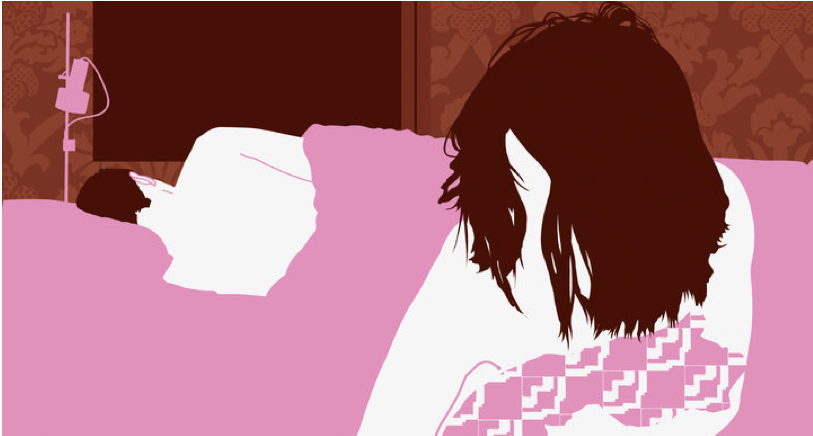WELLNESS--For an issue that affects nearly 75 percent of women, painful intercourse, sometimes called dyspareunia, can feel incredibly isolating.
Thankfully, understanding the specific discomfort you’re experiencing can help you and your health care provider find the right treatment.
HuffPost chatted with experts to get their insight on the conditions and causes that can lead to painful sex, and the possible solutions worth trying. After all, sex should feel good.
- You might not be fully aroused — and therefore not fully lubricated.
There are many factors that contribute to lack of arousal. A big one? The undue amount of pressure women put on themselves in the bedroom, according to Vanessa Marin, a sex therapist based in Los Angeles.
The myth that men are always ready for sex can make women feel guilty about needing more time for foreplay, resulting in penetration that may feel too tight, Marin said, or an almost chafing quality. If you’re feeling totally turned on but your vagina feels tight and dry, a silicone-based lubricant can be an incredible quick fix.
- It could be vaginismus.
Vaginismus is “involuntary hyper contractility of the pelvic floor muscles with either penetration or attempted vaginal penetration,” according to Leah Millheiser, director of the Female Sexual Medicine Program at Stanford University Medical Center. In other words, the muscles in and around your vagina will tense up, making penetration extremely difficult and more painful.
The causes can vary, but there’s likely an emotional component at play here. If someone has experienced past trauma — be it sexual assault or a childhood injury of the groin — it can cause anxiety associated with penetration, and result in clenching as a protective measure.
“Unfortunately, once someone perceives that something’s gonna hurt, they clench their muscles even more,” explained Rebecca Brightman, an OB-GYN based in New York. Luckily, with cognitive therapy and/or pelvic floor physical therapy, Brightman and Millheiser have seen patients with vaginismus make full recoveries.
- You might have an STI or another infection.
Sexually transmitted infections like chlamydia and gonorrhea can cause pelvic pain during intercourse, according to Brightman and Millheiser. Or, if you’re experiencing external pain around the vulva, it may be due to a herpes outbreak. If you see lesions or sores, head to your doctor ― they can prescribe medicine to help control outbreaks. Your physician can also prescribe antibiotics for other STIs.
A yeast infection is not an STI, but that too can cause external itching and chafing or internal burning that can make sex feel uncomfortable. Over-the-counter medication or a prescription from your doctor can help clear it up ASAP.
- Your partner’s technique is just all wrong for you.
Learning how to advocate for what feels good in bed can be challenging, but it’s incredibly important ― not only for your emotional intimacy, but for your physical comfort. To help you both figure out what’s best, Marin suggests a gentle round of “This or That?”
Basically, have your partner touch the same area in two different ways and see which you respond to more favorably. Do you prefer a massage or a stroke? A flick or a tap? You don’t have to figure it all out at once, but taking baby steps can help you direct your partner into better sex for both of you, Marin said.
Subscribe to HuffPost’s wellness email
The essential guide to taking care of your mind and body.
- It could be endometriosis.
Endometriosis is a condition where tissue that normally lines the inside of your uterus grows outside it, resulting in a painful buildup of scar tissue that especially hurts during intercourse.
Organs move around a bit during sex, and if scar tissue is making your pelvis and cervix less mobile, it’s going to feel painful. Additionally, endometriosis can result in cysts on your ovaries (or you may have monthly cysts due to your menstrual cycle), which can cause discomfort.
Treatments including hormone therapy or surgery can help with endometriosis. And if an ovarian cyst is causing severe pain during intercourse, it may be large enough to warrant surgical removal, Millheiser noted.
- It could be your birth control.
An intrauterine device that’s become dislodged could cause a deep, sharp pain during sex. Alternatively, your hormonal birth control could be at fault.
Some birth control options, like the pill or the NuvaRing, stop your natural production of hormones and replace them with the lower doses found in the medication, Millheiser said. The result of those lower estrogen and testosterone levels is sometimes a thinning of the skin around the vulva, which can cause inflammation and irritation when stimulated (this is sometimes known as provoked vestibulodynia). Chat with your doctor about alternative birth control options so you can find a better fit.
- It could be childbirth-related.
Similar to some birth control methods, women who are pumping or breastfeeding following childbirth might expect some painful intercourse. Both Brightman and Millheiser explained that the change in hormone levels can cause the vagina to be dryer and the skin to thin.
With treatments like vaginal estrogen therapy (medicinal treatment in the form of pills, suppositories or patches), or just good old-fashioned lube, you can expect to make sex more comfortable during this process, Millheiser said.
- You might have a gastrointestinal issue.
We’re quick to point fingers at gynecological issues when it comes to perplexing pain. But it’s possible your bowels are actually the cause.
If someone is constipated or has IBS and has intercourse, that could be putting pressure on an already irritated part of the body, resulting in discomfort felt low in the bowels, according to Millheiser. But a doctor can diagnose both conditions and prescribe medication to help.
While there are many potential causes of dyspareunia, there are also plenty of treatments. Painful sex is a pain, but it doesn’t have to be permanent.
(Posted originally at HuffPost
















